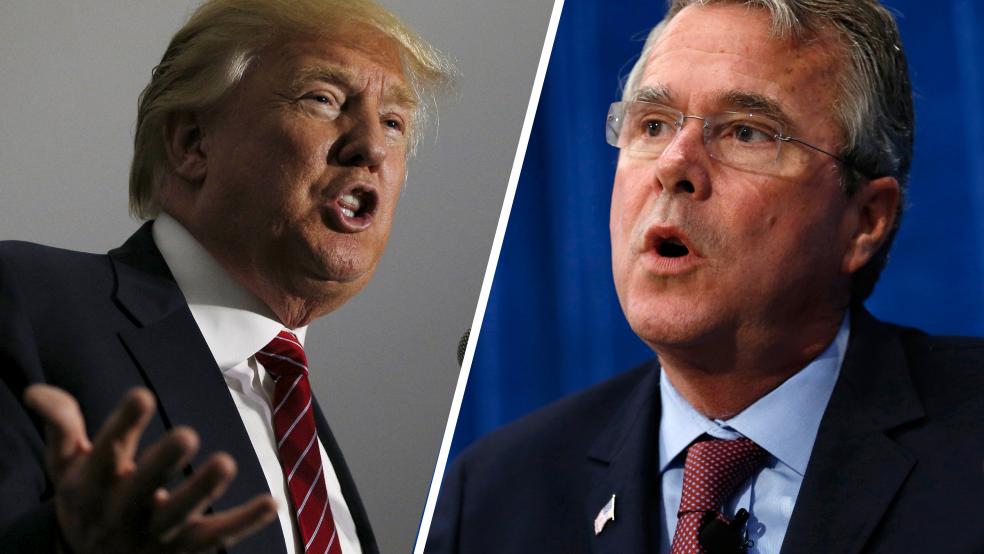Amid signs that the U.S. economy is beginning to slow down again, the leading Republican presidential candidates were in near agreement at Wednesday night’s GOP presidential debate that major tax reform – including deep cuts in rates across the board -- would be included in any long-term economic initiatives.
Indeed, many of the GOP candidates, including billionaire Donald Trump, former Florida governor Jeb Bush and Sen. Marco Rubio, have floated comprehensive tax plans in recent months that consolidate and reduce individual and corporate tax rates to spur economic growth. Retired neurosurgeon Ben Carson and Sen. Rand Paul of Kentucky, meanwhile, are pressing to scrap the tax code in favor of a 10 percent to 15 percent flat tax that would apply equally to all Americans, with some exceptions for low-income families.
Related: Bush Tumbles, Rubio Soars in Third GOP Debate
While many economists agree that these proposals could spur investment, economic growth and job creation over the coming decade, most of the Republican candidates don’t acknowledge that these approaches inevitably will reduce revenue collections and drive up the long-term debt by tens of trillions of dollars.
The tradeoff between tax cuts and higher debt became an issue during the two-hour debate in Boulder, Colorado when CNBC moderators cited estimates of huge revenue losses in the coming decade and the presidential candidates dismissed it as an incomplete picture.
Alan Cole, an economist with the independent Tax Foundation who has studied the proposals, said that all of the proposals for promoting growth through deep tax cuts “come with some sort of revenue hit.”
“Some of these candidates are cutting revenues by up to 20 percent per year,” he said in an interview Thursday. “And if you’re cutting revenues by 20 percent initially, you would need your economy to quickly grow by 20 percent in order to finance your tax cut entirely through growth. And that’s not a realistic assumption.”
Related: RNC Chair Accuses CNBC of Media Bias at Contentious GOP Debate
Ohio Gov. John Kasich, one of the few skeptics in the GOP presidential field, said Wednesday that these plans are “fantasy tax schemes” that “would put us trillions and trillions of dollars in debt.”
While Trump, Carson and others routinely complain about unrestrained government spending and mounting debt, there is a striking disconnect between their massive tax cuts despite the adverse effects it will have on the debt. The Tax Foundation’s detailed analyses of a handful of GOP tax plans graphically tells this story.
Related: Is Marco Rubio ‘Ripping Off’ the State of Florida?
For example, Rubio is promoting a tax plan he devised with Sen. Mike Lee (R-UT) that includes a big tax cut on capital income to spur investment and major cuts for middle-income families, including an increase in the child tax credit from $1,000 to $2,500.
According to a Tax Foundation analysis, Rubio’s plan would spark a 15 percent growth in the Gross Domestic Product over 10 years, a 48.9 percent increase in capital investment, a 12.5 percent hike in wages, and it would create 2.7 million new jobs.
But the downside is that it would cost the Treasury $6 trillion in foregone revenues over the coming decade, using a traditional “static” model for measuring the cost.
| Jeb Bush | Rand Paul | Marco Rubio | Donald Trump | |
| 10-Year GDP Growth | 10% | 12.9% | 15% | 12% |
| Captial Investment | 28.8% | 40.5% | 48.9% | 29% |
| Wage Rate | 7.40% | 11.4% | 12.5% | 6.5% |
| Added Jobs (millions) | 2.7 | 4.3 | 2.7 | 5.3 |
| 10-Year Static Revenue Estimate (billions) | -$3,665 | -$1,797 | -$6,055 | -$11,980 |
| 10-Year Dynamic Revenue Estimate (billions) | -$1,610 | $737 | -$2,401 | -$10,135 |
| Source: Tax Foundation | ||||
Republicans say they are counting on the stimulative effects of tax cuts to grow the economy and generate additional tax revenue that would offset the cost of the tax cuts. It is a faith in Reagan-era supply side economics that some economists say is misplaced. But the Republicans say the experts did not count on another important economic factor—downsizing the cost of government by cutting redundant programs. And if they adopt zero sum budgeting, where every agency has to account for the line items in their program, government costs could be reduced further.
Related: Trump Vows Lower Tax Rates, Revised Trade Agreements, Deep Spending Cuts
For the sake of argument, the Tax Foundation did an alternative analysis of Rubio’s plan that used more “dynamic scoring” of the long-term cost to the Treasury. This time it showed that the tax cuts would cost only $2.4 trillion over the same period.
Similarly, Bush’s across the board tax cut proposals would cost the Treasury $3.6 trillion over ten years using traditional revenue estimating but only $1.6 trillion under dynamic scoring. And Trump’s plan would cost the Treasury $11.9 trillion over the coming decade using conventional projections compared to $10.1 trillion using dynamic revenue estimates.
Carson on Wednesday night wrangled with CNBC moderator Becky Quick over estimates that Carson’s proposed 10 percent to 15 percent flat tax plan for individual income would leave the government in a $2 trillion a year hole.
Carson told Quick that the tax rate would be closer to 15 percent and that his plan – which he has yet to fully developed – would include the elimination of many tax loopholes and deductions, and requires huge cuts in government spending to offset some of the revenue losses.
“We can stimulate the economy,” he said. “That's gonna be the real growth engine. Stimulating the economy -- because it's tethered down right now with so many regulations.”





